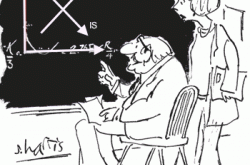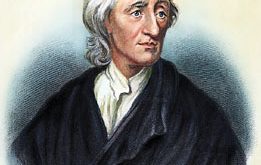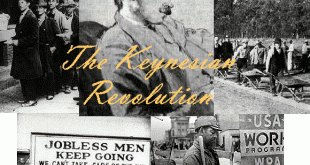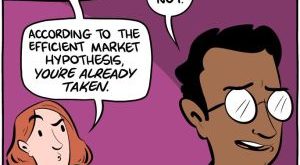Time for an economics reformation [embedded content] Advertisements
Read More »Heretics and mainstream defenders
Heretics and mainstream defenders Larry Elliott wrote a Guardian article the other day criticizing mainstream economics arguing that we should stop treating economics as a science because it is nothing of the sort. A proper science involves testing a hypothesis against the available evidence. If the evidence doesn’t support the theory, a physicist or a biologist will discard the theory and try to come up one that does work empirically. Economics doesn’t...
Read More »Economists — nothing but a bunch of idiots savants
Economists — nothing but a bunch of idiots savants Let’s be honest: no one knows what is happening in the world economy today … Policymakers don’t know what to do. They press the usual (and unusual) levers and nothing happens. Quantitative easing was supposed to bring inflation “back to target.” It didn’t. Fiscal contraction was supposed to restore confidence. It didn’t … Most economics students are not required to study psychology, philosophy, history, or...
Read More »My philosophy of economics
My philosophy of economics A critique yours truly sometimes encounters is that as long as I cannot come up with some own alternative to the failing mainstream theory, I shouldn’t expect people to pay attention. This is, however, to totally and utterly misunderstand the role of philosophy and methodology of economics! As John Locke wrote in An Essay Concerning Human Understanding: The Commonwealth of Learning is not at this time without Master-Builders,...
Read More »Keynes’ intellectual revolution
Keynes’ General Theory is both a critique and a replacement of classical macroeconomic theory. Both are necessary for an intellectual revolution. On one hand, it is a critique and demolition of classical macroeconomics. On the other hand, it offers a novel alternative theory of the workings of a modern industrial capitalist economy … Keynes’ argument involves sweeping away old theory and introducing new theory. First, Keynes rejected the loanable funds theory of interest...
Read More »The Greater Fool Theory
The Greater Fool Theory [embedded content] Guess those guys forgot to read Nassim Taleb’s Fooled by Randomness … Advertisements
Read More »Thirty-three flawed Theses
Five hundred years ago, so legend has it, a dissident priest called Martin Luther nailed a list of 95 "theses" to the door of the Castle Church in Wittenburg. His action launched the Protestant Reformation. Last week, the dissident economist Steve Keen "nailed" a list of 33 Theses to the door of the London School of Economics. His aim was to launch a Reformation in economics as significant as the religious Reformation that Luther started. It was a bold gesture.But for such a movement...
Read More »Don’t believe economic myths. Get the truth!
Don’t believe economic myths. Get the truth! [embedded content] Advertisements
Read More »The Efficient Markets Hypothesis
The Efficient Markets Hypothesis The really interesting questions about the Efficient Markets Hypothesis — at least when discussed by mainstream economists — usually drown in “the model is the message” pseudoscientific mumbo-jumbo of four-factor models with two mispricing factors being better-performing than three-factor models, blah, blah, blah … Diane Coyle has a much more accurate view of what it’s all about: I would defend using the assumption of...
Read More »A Notion of Demand-Led Growth
A key purpose of demand-led growth theory is to extend the ‘principle of effective demand’ to contexts in which productive capacity is best considered variable rather than fixed. The central idea is that, over any time frame, it is demand that determines output, and demand-led variations in income that adjust planned leakages to planned injections. Once it is acknowledged that capacity is variable, it becomes clear that the adjustment of output to demand, and planned leakages to planned...
Read More » Heterodox
Heterodox






